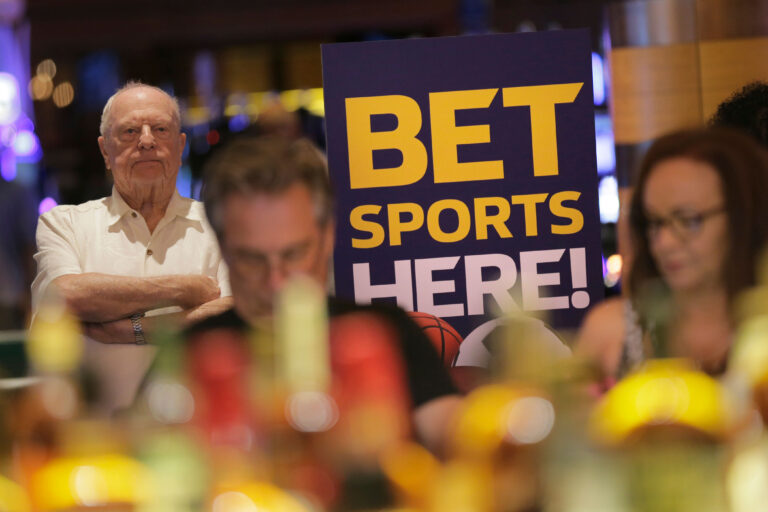The Southern Ute Indian Tribe is suing Gov. Jared Polis and state gaming officials over their handling of online sports betting, arguing that “Governor Polis seriously and clearly erred in his analysis of state and federal law.”
Melvin J. Baker, chairman of the Southern Ute Tribe, discussed the lawsuit Monday at a meeting of the Interim Study Committee on American Indian Affairs, which includes state legislators who focus on issues “of importance to the American Indian community.”
“Today, for the first time in decades, the Southern Ute Indian Tribe is forced to file a lawsuit against the state in federal court because the Colorado state government has refused to honor clear commitments made to the tribe,” Baker said.
A spokesperson for Governor Polis’ office said, “We cannot comment on pending litigation.”
Specifically, the tribes argue that current law allows them to engage in “such gaming activities as are licensed elsewhere in Colorado, so long as the tribe’s gaming activities reflect the amount of wagers placed in Colorado,” according to a copy of the complaint. Proposition DD passed in 2019, adding sports betting to the list of gambling activities permitted in Colorado. But when the tribes established their own sportsbooks, they said they faced resistance from state officials because, according to the complaint, the tribes would not be subject to a 10% tax imposed on other gambling providers.
“The state’s ignoring of binding gambling compacts is motivated by financial incentives,” the lawsuit states. “While Colorado-regulated sports betting is subject to a 10 percent tax, under federal law no such tax applies to tribal gambling. As a result, the state has sought to bar tribes from internet sports betting.”
According to the lawsuit, following a recent court decision involving the Seminole Tribe of Florida, the Southern Ute Tribe’s sportsbook will be able to accept on-reservation bets from online gamblers anywhere in Colorado.
In comments to the committee, Baker said the state “waited until the very last minute” to inform the Southern Ute tribe that its online sportsbook initiative needed state approval. The state required the tribe to pay the state 10 percent of revenue from bets made outside the reservation boundaries, according to tribe court filings.
Baker said the state’s waiting to raise the issue gave competing sports betting sites a head start.
“It’s all about market share, and by waiting until sports betting was legal in Colorado and then blocking tribes’ involvement in sports betting, (the Colorado Gaming Division) denied tribal gaming enterprises any opportunity to gain market share,” Baker told the committee. “While the bill was being drafted and considered, the state had the opportunity to lobby tribal councils on a government-to-government basis, but that did not happen.”
David Smith, legal services director for the Southern Ute Indian Tribe, explained at the committee meeting that the reason tribes are not subject to state gaming taxes is because the law is well established.
“Under federal law, tribes can only use their funds for government operations and the welfare of tribal members. The reason is that tribes have very limited taxing power, so Congress set this up as a way for tribes to help run their governments,” Smith said.
The complaint asks the U.S. District Court for the District of Colorado to investigate the legality of Sky Ute Sportsbook, which closed in July 2023, issue an injunction against the state and order payment of costs incurred by the tribe in filing the lawsuit.
- At the University of Colorado Boulder, the sports betting company targets students.
- Sports betting, water, education: issues raised by Colorado tribal chairman in historic speech at State Capitol
Outside of court, the tribes are asking the Colorado Legislature to resolve the issue legally.
“Most states that have implemented sports betting talked to tribes when they implemented it to ensure a level playing field. But Colorado didn’t. Kansas failed to do that, so they introduced a bill about a year later to ensure a level playing field for tribes. We asked states to do it, and they refused to do it,” Smith said.
In Kansas, the state legislature passed a bill amending existing sports betting laws to specifically target sports betting on reservations.
In both court filings and comments Monday, the Southern Ute Tribe noted that the lawsuit marks a break from a previously friendly relationship with the state of Colorado.
“Colorado is unique from other states in that it has never negotiated any revenue sharing in its gaming compacts, and from the time IGRA was passed in 1988 through the Polis Administration, there has been a strong bipartisan consensus that the state will work with tribes on gaming and respect tribes’ financial and regulatory independence,” the complaint states.
The filing also noted that the tribes had never asked the Colorado Lottery to obtain a license from the Tribal Gaming Commission to sell lottery tickets on tribal lands, “until approximately a year ago, the tribes pointed out the hypocrisy of that juxtaposition to Governor Polis.”
“Litigation is not something we like to do,” Baker said. “We would prefer to resolve our differences amicably. We have been trying to do that for years, but here we have no other choice.”

